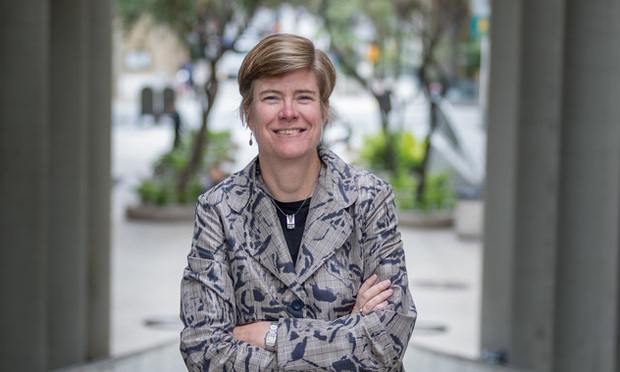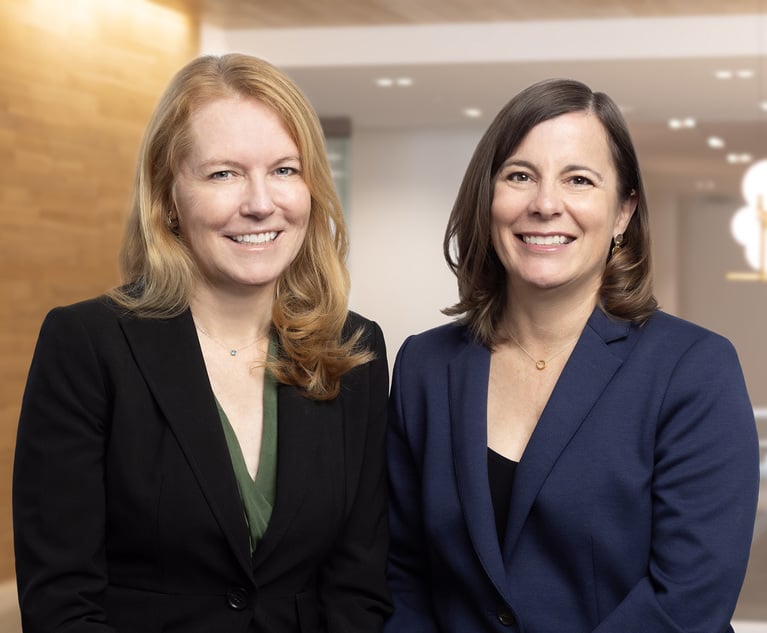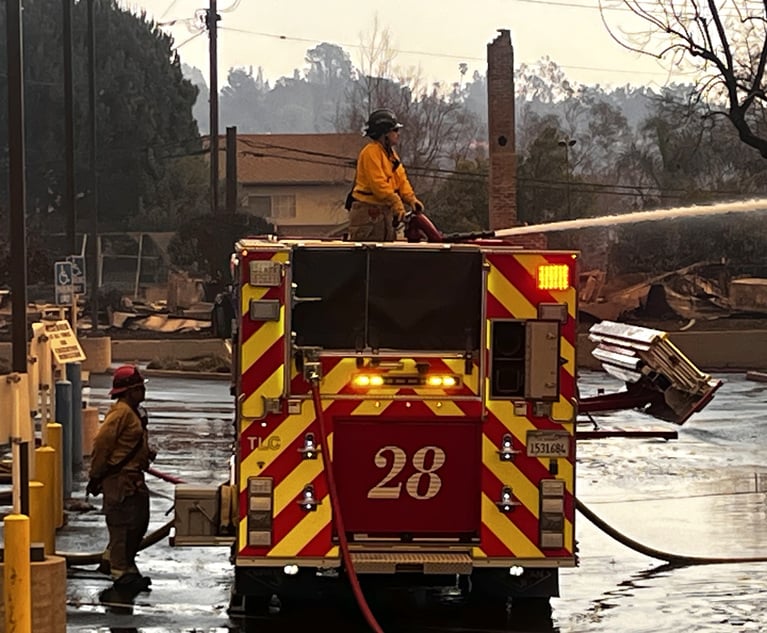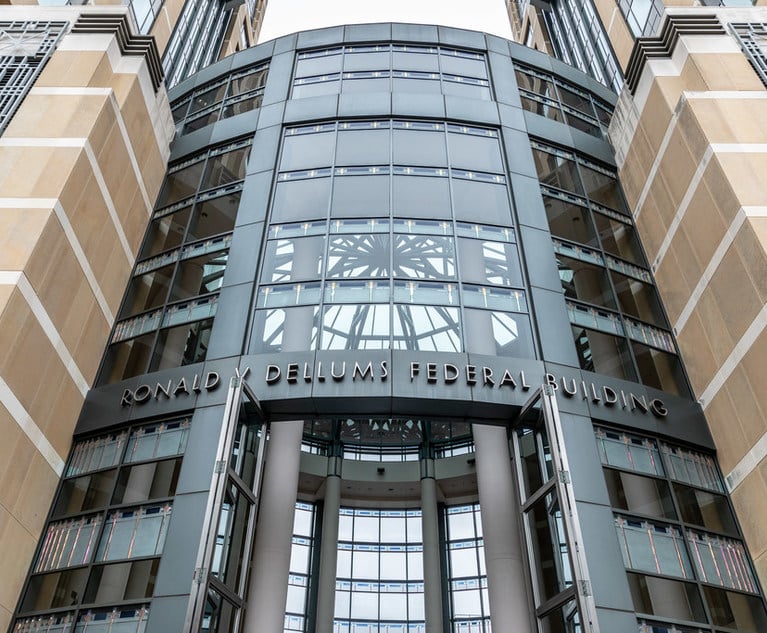Durie Tangri, Ariosa Win Latest Round on Prenatal Test Patents
Judge Susan Illston rules that new Illumina patents on improving noninvasive pregnancy tests are directed to unpatentable natural phenomena.
December 27, 2018 at 07:15 PM
3 minute read
 Daralyn Durie, Durie Tangri. Photo: Jason Doiy/The Recorder
Daralyn Durie, Durie Tangri. Photo: Jason Doiy/The Recorder
The latest patent battle battle between Illumina Inc. and Ariosa Diagnostics Inc. over Ariosa's Harmony prenatal test ended quicker than the first.
U.S. District Judge Susan Illston on Monday ruled that two new patents asserted by Illumina are directed to natural phenomena and are ineligible for patent protection under Section 101. Her 14-page order snuffs out a suit that Illumina filed in May, just a few months after winning a $27 million jury verdict against Ariosa based on older patents.
That case spanned six years, and both sides are appealing the outcome to the U.S. Court of Appeals for the Federal Circuit.
Monday's ruling hands a win to Daralyn Durie of Durie Tangri, a newcomer to the feud.
Illumina and Ariosa, which is owned by Roche Molecular Systems Inc., are rivals in the burgeoning noninvasive prenatal test industry. The tests screen for genetic disorders using a mother's blood sample, reducing the need for riskier procedures like amniocentesis.
Illumina sued Ariosa in May, asserting two patents on a method for enriching cell-free fetal DNA that circulates in maternal plasma. A few years ago, Illumina researchers made what they describe as a surprising discovery that advances the science. They found that fetal DNA fragments are smaller than maternal DNA fragments, and that test results can be improved if fragments greater than 300 base pairs are isolated and removed from the blood sample.
Ariosa has been represented by Irell & Manella, but this time around turned to Durie Tangri. Durie argued that Illumina's 9,580,751 and 9,738.931 patents are directed to nothing more than the observation and analysis of natural phenomena.
On Monday, Illston agreed. “Changing the ratio of two natural products in a mixture and analyzing one of those products does not impact whether an invention is directed towards a natural phenomenon,” she wrote.
Durie said Thursday that a key to the win was raising the argument in an early summary judgment motion, rather than on the pleadings. “We wanted Judge Illston to be confident that she had a complete factual record,” Durie said.
Illumina, which was represented by Weil, Gotshal & Manges partner Edward Reines, took depositions but elected not to submit an expert witness declaration, Durie said.
Reines had argued in his opposition that the U.S. Patent and Trademark Office carefully weighed the eligibility issue in light of a leading Federal Circuit decision on natural phenomena before issuing the patents. The inventors claimed a specific process “in their own inventive way with discrete laboratory steps, including DNA extraction, size separation, removal of DNA above a certain size, and analysis of the resulting DNA fraction,” Reines argued.
This content has been archived. It is available through our partners, LexisNexis® and Bloomberg Law.
To view this content, please continue to their sites.
Not a Lexis Subscriber?
Subscribe Now
Not a Bloomberg Law Subscriber?
Subscribe Now
NOT FOR REPRINT
© 2025 ALM Global, LLC, All Rights Reserved. Request academic re-use from www.copyright.com. All other uses, submit a request to [email protected]. For more information visit Asset & Logo Licensing.
You Might Like
View All
Farella Elevates First Female Firmwide Managing Partners

'Nerve-Wracking': Fires Disrupting but Not Halting Work of Distributed Firms' LA Lawyers
3 minute read
Miami Judge Approves Shaq's $11 Million Settlement to Resolve Astrals Investor Claims
3 minute read
Crypto Exchange’s ‘Meteoric Rise’ Leads to Nationwide Class Action Trend
4 minute readTrending Stories
- 1'There's Always More to Be Done': Former US Attorney Breon Peace Reflects on Series of Firsts at EDNY
- 2Former Thomas Clerk Sarah Harris to Serve as Acting Solicitor General
- 3Coral Gables Firm Secures $26M Settlement
- 4Trump's Second Term Spurs Unusual Alliances Between US and European Law Firms
- 5Honored by NYSBA, 2nd Circuit Chief Judge Livingston's Remarks Stress Judicial Safety
Who Got The Work
J. Brugh Lower of Gibbons has entered an appearance for industrial equipment supplier Devco Corporation in a pending trademark infringement lawsuit. The suit, accusing the defendant of selling knock-off Graco products, was filed Dec. 18 in New Jersey District Court by Rivkin Radler on behalf of Graco Inc. and Graco Minnesota. The case, assigned to U.S. District Judge Zahid N. Quraishi, is 3:24-cv-11294, Graco Inc. et al v. Devco Corporation.
Who Got The Work
Rebecca Maller-Stein and Kent A. Yalowitz of Arnold & Porter Kaye Scholer have entered their appearances for Hanaco Venture Capital and its executives, Lior Prosor and David Frankel, in a pending securities lawsuit. The action, filed on Dec. 24 in New York Southern District Court by Zell, Aron & Co. on behalf of Goldeneye Advisors, accuses the defendants of negligently and fraudulently managing the plaintiff's $1 million investment. The case, assigned to U.S. District Judge Vernon S. Broderick, is 1:24-cv-09918, Goldeneye Advisors, LLC v. Hanaco Venture Capital, Ltd. et al.
Who Got The Work
Attorneys from A&O Shearman has stepped in as defense counsel for Toronto-Dominion Bank and other defendants in a pending securities class action. The suit, filed Dec. 11 in New York Southern District Court by Bleichmar Fonti & Auld, accuses the defendants of concealing the bank's 'pervasive' deficiencies in regards to its compliance with the Bank Secrecy Act and the quality of its anti-money laundering controls. The case, assigned to U.S. District Judge Arun Subramanian, is 1:24-cv-09445, Gonzalez v. The Toronto-Dominion Bank et al.
Who Got The Work
Crown Castle International, a Pennsylvania company providing shared communications infrastructure, has turned to Luke D. Wolf of Gordon Rees Scully Mansukhani to fend off a pending breach-of-contract lawsuit. The court action, filed Nov. 25 in Michigan Eastern District Court by Hooper Hathaway PC on behalf of The Town Residences LLC, accuses Crown Castle of failing to transfer approximately $30,000 in utility payments from T-Mobile in breach of a roof-top lease and assignment agreement. The case, assigned to U.S. District Judge Susan K. Declercq, is 2:24-cv-13131, The Town Residences LLC v. T-Mobile US, Inc. et al.
Who Got The Work
Wilfred P. Coronato and Daniel M. Schwartz of McCarter & English have stepped in as defense counsel to Electrolux Home Products Inc. in a pending product liability lawsuit. The court action, filed Nov. 26 in New York Eastern District Court by Poulos Lopiccolo PC and Nagel Rice LLP on behalf of David Stern, alleges that the defendant's refrigerators’ drawers and shelving repeatedly break and fall apart within months after purchase. The case, assigned to U.S. District Judge Joan M. Azrack, is 2:24-cv-08204, Stern v. Electrolux Home Products, Inc.
Featured Firms
Law Offices of Gary Martin Hays & Associates, P.C.
(470) 294-1674
Law Offices of Mark E. Salomone
(857) 444-6468
Smith & Hassler
(713) 739-1250






